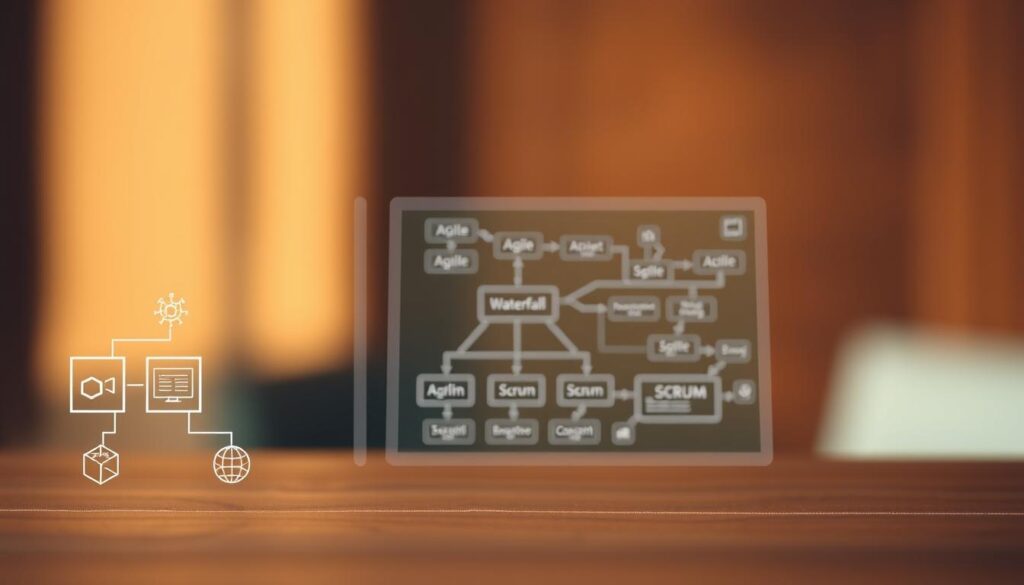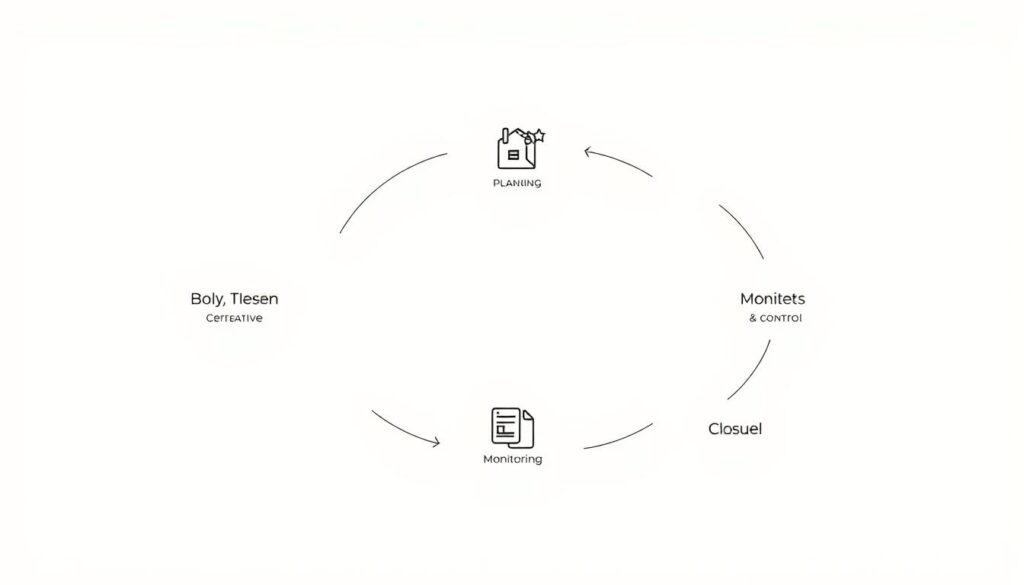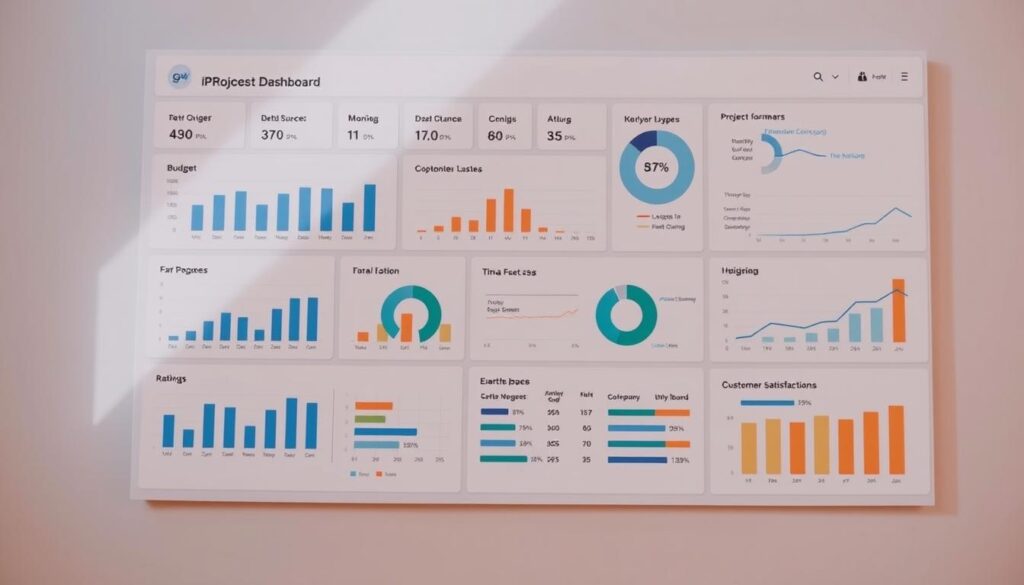A project manager plays a vital role in driving the success of a project by coordinating its various elements.
The role involves overseeing the planning, execution, and delivery of a project, ensuring it is completed on time, within budget, and to the required quality standards.
Effective project managers connect the day-to-day work with the bigger picture, supporting the company’s broader objectives. With the median salary for project managers in the United States being around $115,000 per year, this role is not only challenging but also rewarding.
Key Takeaways
- A project manager coordinates project elements to ensure timely completion within budget and with high standards.
- Project managers play a crucial role in supporting the company’s broader objectives.
- The median salary for project managers in the United States is around $115,000 per year.
- Salaries for project managers can range from $60,000 to over $200,000 annually, depending on the job and location.
- Becoming a certified project manager can significantly enhance career prospects.
What is a Project Manager?
Project managers are the driving force behind projects, guiding them from inception to completion. They are the central figure connecting project goals with the collective efforts of their team and help navigate obstacles to guide projects to their goals.
Overview of the Role
A project manager’s role is multifaceted, involving leadership, coordination, and strategic planning. They are responsible for defining project scope, setting objectives, and ensuring that all stakeholders are aligned with the project’s vision. According to Wikipedia, a project manager is defined as the person accountable for accomplishing the project’s objectives.
The project manager’s responsibilities include planning, organizing, and controlling resources to achieve specific goals. They must possess a unique blend of skills, including communication, problem-solving, and time management. Effective project managers are adept at managing both the technical and human aspects of a project.
| Key Responsibilities | Description |
|---|---|
| Project Planning | Defining project scope, setting objectives, and creating schedules. |
| Resource Allocation | Assigning tasks and allocating resources to team members. |
| Risk Management | Identifying, assessing, and mitigating risks that could impact the project. |
Importance in Organizations
Project managers play a crucial role in organizations by ensuring that projects are completed on time, within budget, and to the required quality standards. They facilitate effective communication among stakeholders, including team members, sponsors, and customers. As noted on World Civil Society, effective project management is critical for the success of complex projects, such as those in civil engineering.
The importance of project managers is underscored by their ability to navigate complex project dynamics, manage resources efficiently, and drive projects towards successful outcomes. Their role is vital in today’s fast-paced business environment, where the ability to deliver projects efficiently can be a significant competitive advantage.
Key Responsibilities of a Project Manager

The responsibilities of a project manager are diverse and critical to the effective execution of a project. A project manager’s role encompasses a wide range of duties that are essential for achieving project goals.
Planning and Scheduling
One of the primary responsibilities of a project manager is planning and scheduling. This involves developing a comprehensive project plan, defining project scope, and creating a schedule that outlines key milestones and deadlines. Effective planning and scheduling are crucial for ensuring that projects are completed on time and within budget.
As noted by Purdue University’s Project Management Certification, a well-structured project plan is essential for guiding the project team and stakeholders.
Resource Allocation
Resource allocation is another critical responsibility of a project manager. This involves identifying the resources required for the project, including personnel, equipment, and materials, and allocating them effectively to ensure project success. A project manager must also manage resource utilization and adjust allocations as needed throughout the project lifecycle.
Risk Management
Risk management is a vital aspect of project management. Project managers must identify potential risks, assess their impact, and develop strategies to mitigate or manage them. This proactive approach helps minimize the likelihood of project delays or cost overruns.
According to World Civil Society, effective risk management is a hallmark of successful project management, enabling project managers to navigate complex challenges.
Stakeholder Communication
Stakeholder communication is essential for project success. Project managers must communicate effectively with various stakeholders, including team members, sponsors, and clients, to ensure that everyone is informed and aligned with project goals. This involves regular updates, progress reports, and addressing any concerns or issues that arise.
- Identify stakeholders and their needs
- Develop a communication plan
- Provide regular project updates
- Address stakeholder concerns promptly
Effective stakeholder communication is critical for building trust and ensuring that project objectives are met. As project managers navigate the complexities of their role, they must remain focused on delivering projects that meet stakeholder expectations.
Skills Required for Effective Project Management
A project manager’s effectiveness is directly related to their possession of key skills such as leadership, time management, technical proficiency, and problem-solving. These skills are fundamental to ensuring that projects are executed efficiently and effectively.
Leadership and Team Management
Effective leadership is crucial for motivating team members and guiding them towards achieving project objectives. A project manager must be able to lead by example, foster a collaborative environment, and make informed decisions that impact the project’s success.
Team management involves not only assigning tasks but also ensuring that each team member has the resources and support needed to complete their work. This includes providing feedback, resolving conflicts, and promoting a positive team culture.
Time Management
Time management is another critical skill for project managers, as it involves planning and controlling the project schedule to ensure timely completion. This includes setting realistic deadlines, prioritizing tasks, and allocating resources efficiently.
Effective time management also requires the ability to identify and mitigate potential delays, thereby minimizing their impact on the project timeline.
Technical Proficiency
Having a certain level of technical proficiency is essential for project managers, as it enables them to understand the project’s technical aspects and make informed decisions. This includes being familiar with the tools, technologies, and methodologies used in the project.
Technical skills also facilitate effective communication with team members and stakeholders, ensuring that technical information is conveyed clearly and accurately.
Problem-Solving Skills
Problem-solving is a vital skill for project managers, as it involves identifying, analyzing, and resolving problems that arise during the project lifecycle. This requires a logical and methodical approach to problem-solving, as well as the ability to remain calm under pressure.
Effective problem-solving also involves collaborating with team members to identify solutions and implement corrective actions.
Types of Project Management Methodologies

Understanding the different types of project management methodologies is crucial for project success. Various project management methodologies exist, including Waterfall, Agile, Lean, and Hybrid approaches, each designed to manage projects effectively in different contexts.
Waterfall Methodology
The Waterfall methodology is a traditional, linear approach to project management. It is characterized by a sequential design process where progress flows in one direction through several phases, such as analysis, design, implementation, and testing. This methodology is suitable for projects with well-defined requirements and where changes are unlikely.
Agile Methodology
Agile is an iterative and flexible approach that emphasizes collaboration, customer feedback, and rapid delivery. It involves breaking down the project into smaller, manageable chunks, and working on them in iterations or sprints. Agile is particularly useful for projects with rapidly changing requirements or where customer feedback is crucial.
Lean Methodology
Lean project management focuses on maximizing value while minimizing waste. It involves identifying and eliminating non-value-added activities, thereby streamlining processes. Lean is beneficial for projects where efficiency and cost-effectiveness are key.
Hybrid Approaches
Hybrid methodologies combine elements from different project management approaches to create a tailored methodology that suits the specific needs of a project. For instance, combining Waterfall and Agile methodologies can offer the predictability of Waterfall with the flexibility of Agile.
To learn more about the different types of project management methodologies, you can visit this resource for detailed insights.
In conclusion, the choice of project management methodology depends on the project’s specific needs, the team’s experience, and the organizational culture. By understanding the strengths and weaknesses of each methodology, project managers can make informed decisions to ensure successful project outcomes.
Tools Commonly Used by Project Managers
Effective project management relies heavily on the right set of tools to streamline processes and enhance productivity. Project managers today have access to a wide array of tools designed to facilitate various aspects of project execution, from planning and scheduling to team collaboration and progress tracking.
Project Management Software
Project management software is a cornerstone for many project managers, offering features such as task assignment, scheduling, and progress tracking. Popular options include Asana, Trello, and Microsoft Project. These tools help in organizing tasks, setting deadlines, and monitoring progress, thereby enhancing team productivity and project visibility. For instance, a project manager can use project management tools to oversee complex civil engineering projects, ensuring timely completion and resource allocation.
Communication Tools
Effective communication is crucial for project success, and various tools have been developed to facilitate this. Communication tools such as Slack, Microsoft Teams, and Zoom enable real-time messaging, video conferencing, and file sharing. These tools help in keeping team members connected, regardless of their geographical location, thereby fostering collaboration and reducing misunderstandings.
Time Tracking Applications
Time tracking applications are essential for monitoring how much time is spent on tasks and projects. Tools like Toggl, Harvest, and Clockify allow project managers to track time spent on various activities, providing insights into productivity and helping in accurate billing and resource allocation. By understanding how time is utilized, project managers can make informed decisions to optimize project schedules and resource utilization.
In conclusion, the right set of tools can significantly enhance a project manager’s ability to plan, execute, and deliver projects successfully. By leveraging project management software, communication tools, and time tracking applications, project managers can improve team collaboration, monitor progress, and make data-driven decisions.
The Project Lifecycle Explained

Effective project management involves understanding and navigating the different phases of the project lifecycle. The project lifecycle consists of four primary phases: initiation, planning, execution, and closing. Each phase plays a critical role in the successful delivery of a project.
Initiation Phase
The initiation phase is where the project’s foundation is laid. It involves defining the project’s objectives, identifying stakeholders, and determining the project’s feasibility. During this phase, the project manager’s responsibilities include developing the project charter and securing stakeholder buy-in.
Planning Phase
In the planning phase, the project manager creates a detailed project plan that outlines how the project will be executed. This includes setting timelines, allocating resources, and identifying potential risks. The project plan serves as a roadmap for the project, ensuring that all stakeholders are aligned and working towards the same objectives.
Key Components of the Project Plan:
- Scope statement
- Work breakdown structure (WBS)
- Project schedule
- Resource allocation plan
- Risk management plan
Execution Phase
During the execution phase, the project plan is put into action. The project manager’s role involves coordinating and directing the project team, managing resources, and ensuring that the project is progressing according to plan. This phase requires strong leadership and communication skills to keep the project on track.
Closing Phase
The closing phase marks the completion of the project. The project manager’s responsibilities include ensuring that all project deliverables are completed, documenting lessons learned, and obtaining final acceptance from stakeholders. This phase is crucial for evaluating the project’s success and identifying areas for improvement.
The following table summarizes the key activities and deliverables for each phase of the project lifecycle:
| Phase | Key Activities | Deliverables |
|---|---|---|
| Initiation | Define project objectives, identify stakeholders | Project charter |
| Planning | Create project plan, allocate resources | Project plan, scope statement |
| Execution | Coordinate project team, manage resources | Project progress reports |
| Closing | Complete project deliverables, document lessons learned | Final project report, lessons learned document |
Understanding the project lifecycle and the project manager’s responsibilities within each phase is essential for delivering successful projects. By effectively managing each phase, project managers can ensure that their projects are completed on time, within budget, and to the satisfaction of all stakeholders.
Differences Between Project Manager and Program Manager
The roles of project managers and program managers differ significantly in terms of their scope, responsibilities, and required skills. While both are crucial to the success of organizational projects, understanding their distinct roles is essential for effective project execution.
Scope of Work
A project manager is responsible for a specific project with defined objectives, timelines, and resources. In contrast, a program manager oversees a group of related projects that are managed together to achieve strategic benefits. The scope of work for a program manager is broader, encompassing multiple projects that may share resources and stakeholders.
Project managers focus on delivering a single project within the defined constraints, whereas program managers aim to achieve the strategic objectives of the organization through the coordination of multiple projects. This distinction in scope affects their responsibilities and the skills required for each role.
Responsibilities
The responsibilities of project managers and program managers vary significantly due to their different scopes of work. Project managers are tasked with planning, executing, and closing projects. They are responsible for resource allocation, risk management, and ensuring that the project is completed on time, within budget, and to the required quality standards.
Program managers, on the other hand, have a more complex set of responsibilities. They must oversee the coordination of multiple projects, manage inter-project dependencies, and ensure that the program delivers the expected strategic benefits. Program managers are also responsible for managing program-level risks and ensuring that the program aligns with the organization’s strategic objectives.
- Project managers are responsible for project planning, execution, and closure.
- Program managers oversee multiple projects, manage inter-project dependencies, and ensure strategic alignment.
Skill Sets
The skill sets required for project managers and program managers differ due to the complexity and scope of their responsibilities. Project managers need strong technical skills related to project management, including planning, risk management, and quality control. They must also possess excellent communication and leadership skills to manage their project teams effectively.
Program managers require a broader set of skills, including strategic thinking, program governance, and the ability to manage complex inter-project dependencies. They must also have excellent stakeholder management skills, as they interact with a wide range of stakeholders across multiple projects.
Both roles require strong leadership and communication skills, but program managers need additional skills related to strategic management and program governance.
Education and Certifications

Education and certifications play a crucial role in the career development of project managers. As the field continues to evolve, the importance of formal education and professional certifications cannot be overstated.
Degree Requirements
A bachelor’s degree is often a minimum requirement for project management roles. While the degree can be in any field, courses in business administration, management, or a related area can be particularly beneficial. Some employers may prefer or require a master’s degree, especially for senior or complex project management positions.
Project Management Certifications
Certifications such as the Project Management Professional (PMP) are highly regarded in the industry. The PMP certification, offered by the Project Management Institute (PMI), demonstrates that a project manager has the knowledge, skills, and experience to lead projects effectively. Other certifications, like the Certified Associate in Project Management (CAPM), are also valuable, especially for those new to the field.
For more information on project management certifications, visit https://www.allbusinessschools.com/project-management/certification/.
- PMP Certification: Ideal for experienced project managers.
- CAPM Certification: Suitable for those starting their project management career.
- Agile Certifications: Focus on agile methodologies, beneficial for projects requiring flexibility.
Continuing Education Opportunities
Continuing education is vital for project managers to stay updated with the latest methodologies, tools, and best practices. This can include workshops, online courses, and conferences. Many professional organizations, like the PMI, offer various continuing education opportunities.
By combining formal education with professional certifications and ongoing learning, project managers can significantly enhance their career prospects and effectiveness in managing projects.
The Importance of Communication in Project Management
In the realm of project management, communication plays a pivotal role in determining project success. Effective communication ensures that all stakeholders are informed, aligned, and working towards the same objectives.
Project managers must employ various communication techniques to facilitate collaboration and information exchange among team members and stakeholders. These techniques are crucial for preventing misunderstandings, managing expectations, and ensuring that project goals are met.
Techniques for Effective Communication
Several techniques can enhance communication in project management:
- Regular status updates to keep stakeholders informed
- Clear and concise messaging to avoid confusion
- Active listening to understand team members’ concerns
- Using appropriate communication channels for different messages
By implementing these techniques, project managers can significantly improve team collaboration and stakeholder satisfaction.
Tools to Enhance Communication
In addition to techniques, various tools can facilitate effective communication in project management. Some of these tools include:
| Tool | Description | Benefits |
|---|---|---|
| Slack | Real-time messaging platform | Enhances team collaboration and reduces email clutter |
| Trello | Visual project management tool | Helps in organizing tasks and tracking progress |
| Microsoft Teams | Integrated communication and collaboration platform | Combines chat, video meetings, and file storage |
These tools, when used appropriately, can significantly enhance communication and collaboration within project teams.
Effective communication is a critical project manager skill that contributes to the success of a project. By leveraging both techniques and tools, project managers can ensure that their teams are well-coordinated and stakeholders are kept informed throughout the project lifecycle.
How to Measure Project Success

Understanding project success involves analyzing various performance indicators and stakeholder feedback. Measuring project success is crucial for organizations to evaluate the effectiveness of their project management strategies and identify areas for improvement.
Key Performance Indicators (KPIs)
KPIs are quantifiable measures used to evaluate the success of a project. They are typically aligned with the project’s objectives and can include metrics such as:
- Schedule Performance Index (SPI): Measures the project’s progress against its planned schedule.
- Cost Performance Index (CPI): Evaluates the project’s cost efficiency by comparing the earned value to the actual cost.
- Scope Fulfillment: Assesses whether the project has delivered the required scope without significant deviations.
For more information on project evaluation, you can refer to resources such as project evaluation guides.
Stakeholder Satisfaction
Stakeholder satisfaction is a critical aspect of project success. It involves gauging the satisfaction levels of various stakeholders, including clients, team members, and sponsors. Techniques for measuring stakeholder satisfaction include:
- Surveys and Feedback Forms: Collecting feedback through structured surveys or forms.
- Regular Meetings: Holding periodic meetings to discuss stakeholder concerns and expectations.
- Stakeholder Interviews: Conducting in-depth interviews to understand stakeholder perceptions.
Financial Analysis
Financial analysis is another vital component of measuring project success. It involves evaluating the project’s financial performance by analyzing:
- Return on Investment (ROI): Calculates the return or profit generated by the project relative to its cost.
- Net Present Value (NPV): Determines the present value of future cash flows generated by the project, discounted at a specific rate.
- Cost-Benefit Analysis: Compares the project’s costs with its benefits to assess its overall financial viability.
By combining these metrics, project managers can gain a comprehensive understanding of their project’s success and identify opportunities for improvement in future projects.
Challenges Faced by Project Managers
Project managers are tasked with navigating complex challenges that can affect project outcomes. These challenges can arise from various sources, including internal team dynamics, external stakeholder expectations, and organizational constraints.
Managing Resource Constraints
One of the significant challenges project managers face is managing resource constraints. This includes allocating limited resources such as budget, personnel, and equipment effectively across different projects and tasks. Efficient resource allocation is crucial to ensure that projects are completed on time and within budget.
- Identify resource requirements early in the project lifecycle.
- Prioritize tasks based on resource availability.
- Utilize resource leveling techniques to optimize resource utilization.
Dealing with Scope Creep
Scope creep refers to the uncontrolled changes or continuous growth in a project’s scope, which can lead to delays, cost overruns, and reduced quality. Project managers must effectively manage stakeholder expectations and ensure that any changes to the project scope are properly assessed, documented, and approved.
- Establish a clear project scope statement.
- Implement a change management process.
- Communicate scope changes to all stakeholders.
Navigating Team Dynamics
Navigating team dynamics is another critical challenge for project managers. This involves understanding the strengths, weaknesses, and motivations of team members to foster a collaborative and productive team environment. Effective team leadership is essential for achieving project goals.
- Promote open communication within the team.
- Encourage team-building activities.
- Address conflicts promptly and fairly.
By understanding and addressing these challenges, project managers can improve their ability to deliver successful projects. It is crucial for project managers to be proactive, flexible, and adept at managing both the technical and human aspects of their projects.
The Future of Project Management

The future of project management is being shaped by emerging trends, technological advancements, and changing skill requirements. As organizations continue to navigate complex projects, the role of the project manager is becoming increasingly critical.
Trends in the Industry
Several trends are influencing the future of project management. One significant trend is the adoption of Agile methodologies, which emphasize flexibility, iterative progress, and continuous improvement. Another trend is the increasing use of data analytics to inform project decisions and drive outcomes.
The rise of remote work is also impacting project management, with teams spread across different locations and time zones. This shift requires project managers to be adept at using digital communication tools and managing virtual teams effectively.
Technology Impact
Technology is revolutionizing project management, with tools and software becoming more sophisticated and integrated. Project management information systems (PMIS) are being used to streamline processes, enhance collaboration, and improve project visibility.
The use of artificial intelligence (AI) and machine learning (ML) is also on the rise, enabling project managers to predict potential issues, optimize resource allocation, and make data-driven decisions.
Evolving Skills Requirements
As project management continues to evolve, the skills required to succeed in this field are also changing. Project managers need to develop technical skills, such as proficiency in project management software and data analysis. They must also possess soft skills, including leadership, communication, and problem-solving.
The ability to adapt to change, lead virtual teams, and navigate complex stakeholder landscapes is becoming increasingly important. As the project management landscape continues to shift, professionals in this field must be committed to ongoing learning and professional development.
The Role of a Project Manager in Different Industries
In industries ranging from construction to IT and marketing, project managers are essential for driving projects to successful completion. The role of a project manager is multifaceted and varies significantly across different sectors.
Construction
In the construction industry, project managers oversee the planning, coordination, and execution of construction projects. They are responsible for ensuring that projects are completed on time, within budget, and to the required quality standards.
- Managing construction schedules and budgets
- Coordinating with architects, engineers, and contractors
- Ensuring compliance with safety regulations and building codes
For more information on engineering management and its relation to project management, visit this resource.
IT and Software Development
In IT and software development, project managers are responsible for overseeing the development, implementation, and maintenance of software systems. They must be adept at managing technical teams and ensuring that projects meet the required specifications and timelines.
Key responsibilities include:
- Defining project scope and objectives
- Managing technical resources and timelines
- Ensuring quality assurance and testing
Marketing
In the marketing industry, project managers coordinate campaigns, product launches, and other marketing initiatives. They must be skilled at managing cross-functional teams and ensuring that marketing projects are executed effectively and efficiently.
Key challenges in marketing project management include:
- Managing multiple stakeholders and expectations
- Coordinating with creative teams and vendors
- Meeting tight deadlines and budget constraints
By understanding the unique demands of each industry, project managers can tailor their approaches to meet specific needs and drive project success.
Building a Successful Project Management Team

Assembling a high-performing project management team is crucial for the success of any project. This involves several key strategies that ensure the team is capable, collaborative, and committed to continuous improvement.
Hiring the Right Talent
Hiring individuals with the right skills and attitude is the first step towards building a successful team. It’s not just about technical skills; it’s also about finding people who can work well under pressure and collaborate effectively.
When hiring for a project management team, it’s essential to look beyond just technical skills. Behavioral competencies such as teamwork, problem-solving, and adaptability are just as crucial. Utilizing a mix of interview techniques, including behavioral interviews and technical assessments, can help identify the best candidates.
| Skill Type | Assessment Method | Importance Level |
|---|---|---|
| Technical Skills | Technical Assessments | High |
| Behavioral Competencies | Behavioral Interviews | High |
| Soft Skills | Reference Checks | Medium |
Fostering Collaboration
Fostering a collaborative environment is key to team success. Regular team-building activities can enhance trust and communication among team members. Tools like Slack or Microsoft Teams can facilitate ongoing communication.
Continuous Improvement
Promoting a culture of continuous improvement involves ongoing training and feedback mechanisms. This not only enhances skills but also keeps the team motivated and engaged.
Project Management Best Practices
Best practices in project management serve as a roadmap for project managers to navigate the complexities of their role. By adopting these practices, project managers can significantly enhance the likelihood of project success.
Setting Clear Goals
Setting clear goals is fundamental to project success. It involves defining project objectives, deliverables, and timelines. Clear goals provide direction and focus for the project team, ensuring everyone works towards the same outcomes.
To set clear goals, project managers should:
- Define SMART (Specific, Measurable, Achievable, Relevant, Time-bound) objectives
- Establish key performance indicators (KPIs) to measure progress
- Communicate goals and expectations to the project team and stakeholders
Regular Feedback Loops
Regular feedback loops are essential for project managers to monitor progress, identify issues, and make necessary adjustments. Feedback should be constructive, timely, and actionable, allowing team members to learn and improve continuously.
Implementing regular feedback loops involves:
- Conducting regular team meetings and status updates
- Using project management tools to track progress and identify bottlenecks
- Encouraging open communication and transparency within the team
Leveraging Lessons Learned
Leveraging lessons learned is a critical best practice that involves documenting and applying knowledge gained from previous projects to improve future project outcomes. This practice helps in avoiding repeated mistakes and enhancing project delivery processes.
To leverage lessons learned, project managers should:
| Activity | Description | Benefits |
|---|---|---|
| Document Lessons Learned | Record experiences and insights from project activities | Provides valuable knowledge for future projects |
| Analyze and Apply Insights | Analyze documented lessons and apply insights to improve project processes | Enhances project delivery efficiency and effectiveness |
| Share Knowledge Across Teams | Share lessons learned with other project teams and stakeholders | Fosters a culture of continuous improvement |
By integrating these best practices into their project management approach, project managers can improve project outcomes, enhance team performance, and increase stakeholder satisfaction.
Conclusion: The Vital Role of Project Managers
Project managers play a crucial role in driving organizational success by overseeing projects from initiation to completion. Understanding the project manager definition is essential to appreciating their responsibilities, which include planning, resource allocation, and risk management.
The salary of a project manager varies significantly based on factors such as industry, location, and experience. For instance, project managers in the IT sector tend to earn higher salaries compared to those in non-profit organizations.
Key Takeaways and Future Outlook
The key responsibilities of a project manager, including leadership and team management, time management, and technical proficiency, are vital to project success. As the field continues to evolve, project managers must adapt to new methodologies and technologies.
The future outlook for project managers is promising, with growing demand across various industries. As organizations continue to recognize the importance of effective project management, the role of the project manager will remain critical to achieving strategic objectives.
